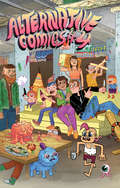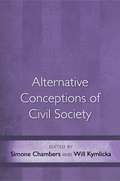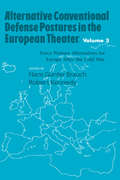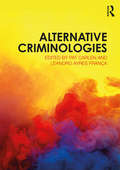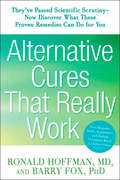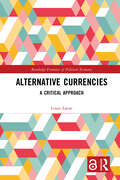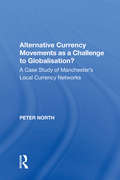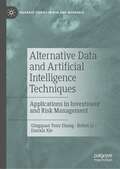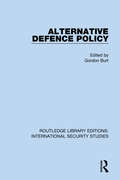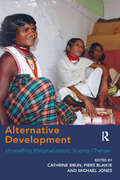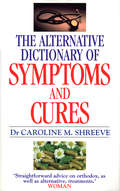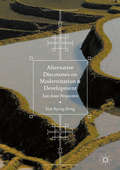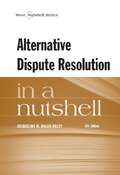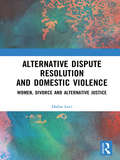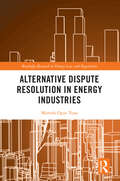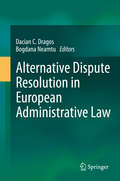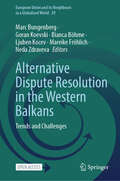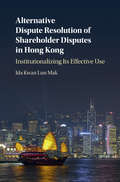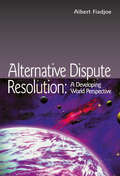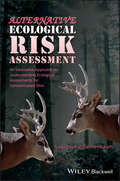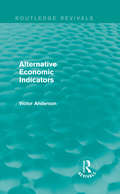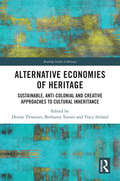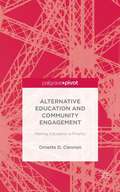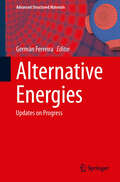- Table View
- List View
Alternative Comics #4
by Craig Thompson Marc Arsenault Theo Ellsworth James Kochalka Noah Van SciverAlternative Comics' flagship anthology returns as a twice-yearly comic with more pages-showcasing the best indie, web and zine artists of today's underground. <P><P> <i>Advisory: Bookshare has learned that this book offers only partial accessibility. We have kept it in the collection because it is useful for some of our members. Benetech is actively working on projects to improve accessibility issues such as these.</i>
Alternative Conceptions of Civil Society (Ethikon Series in Comparative Ethics #1)
by Simone Chambers & Will KymlickaThe idea of civil society has long been central to the Western liberal-democratic tradition, where it has been seen as a crucial site for the development and pursuit of basic liberal values such as individual freedom, social pluralism, and democratic citizenship. This book considers how a host of other ethical traditions define civil society. Unlike most studies of the subject, which focus on a particular region or tradition, it considers a range of ethical traditions rarely addressed in one volume: libertarianism, critical theory, feminism, liberal egalitarianism, natural law, Christianity, Islam, Judaism, and Confucianism. It considers the extent to which these traditions agree or disagree on how to define civil society's limits and how to evaluate its benefits and harms. <P><P>A variety of distinguished advocates and interpreters of these traditions present in-depth explorations of how these various traditions think of ethical pluralism within societies, asking how a society should respond to diversity among its members. Together they produce a work rich with original insights on a wide range of subjects about which little has been written to date. An excellent starting point for a comparative ethics of civil society, this book concludes that while the concept of civil society originated in the liberal tradition, it is quickly becoming an important focus for a truly cross-cultural dialogue. In addition to the editors, the contributors are Michael Banner, Hasan Hanafi, Loren E. Lomasky, Richard Madsen, Michael A. Mosher, Michael Pakaluk, Anne Philips, Adam B. Seligman, Suzanne Last Stone, and Michael Walzer.
Alternative Conventional Defense Postures In The European Theater: Military Alternatives for Europe after the Cold War (Alternative Conventional Defense Postures In The European Theater Ser.)
by Robert Kennedy Hans Günter BrauchFirst published in 1993. Routledge is an imprint of Taylor & Francis, an informa company.
Alternative Criminologies
by Pat Carlen Leandro Ayres FrançaAlternative Criminologies celebrates a kaleidoscopic process of permanent critique and a diversity of social and scientific knowledges. It examines complex and global crime issues in light of the many alternative scientific, artistic, empathetic, campaigning and otherwise imaginative criminologies that attempt to understand and/or fundamentally change why crime and justice take the forms they do. From cutting edge topics such as crimes against humanity, the criminology of mobility, terrorism, cybercrime, corporate crime and green criminology; to gendered perspectives on violence against women, sexualities and feminist and queer criminologies; to key issues in penology such as mass incarceration, the death penalty, desistance from crime, risk and the political economy of punishment; Alternative Criminologies demonstrates the breadth, the variety and the vibrancy of contemporary perspectives on crime, criminalization and punishment. Bringing together 34 leading experts from around the world, this international collection unites fresh and insightful theoretical positions with innovative empirical research and marks an important juncture for criminologies and their imagined futures. Alternative Criminologies is essential reading for students of crime and criminal justice.
Alternative Cures That Really Work: They've Passed Scientific Scrutiny--Now Discover What These Proven Remedies Can Do for You
by Barry Fox Ronald HoffmanDr. Ronald Hoffman and Dr. Barry Fox, two of the nation's top experts on natural and alternative therapies, have teamed up to present the very best that complementary and alternative medicine has to offer.Did you know that:-the herb valerian may alleviate anxiety without causing drowsiness?-homeopathy may clear nasal congestion as effectively as prescription nasal drops?-cinnamon may help control blood sugar—but the trace mineral chromium may work even better?-acupuncture may enhance the effectiveness of a common pain reliever for osteoarthritis?What distinguishes these from other natural and alternative therapies is that they actually work. Dr. Hoffman and Dr. Fox have screened and evaluated hundreds of remedies to identify those that are scientifically proven to be effective for specific health concerns. Their exclusive one- to five-star rating system allows readers to review and compare remedies at a glance to try those of their choosing with confidence. No other book of natural and alternative treatments has used such rigorous scientific standards to determine which treatments are worthy of recommendation.
Alternative Currencies: A Critical Approach (Routledge Frontiers of Political Economy)
by Louis LarueA wide variety of new forms of money have been developed in recent decades as a challenge or complement to the official, dominant currencies. LETS, local currencies, carbon currencies, and Bitcoins are all examples of this new trend. These currencies are at the heart of a larger movement that questions the present state of money and argues that new currencies might help to build resilient economies and “warmer” social relations.This book focuses on radical alternative proposals as well as on small-scale experiments, and makes use of the analytical tools of philosophy and of economics, with one main question in mind: can alternative currencies constitute desirable alternatives to the present monetary system? Overall, the book will raise serious doubts regarding the capacity of such currencies to deliver on their promises. In part, it will show that several arguments in favour of alternative currencies are lacking in consistency and clarity, and are thus in need of thorough revision. More fundamentally, it will argue that these currencies rarely succeed in fulfilling their objectives and that their fulfilment would entail significant conflicts with justice and economic efficiency.This book is addressed to researchers in economics, politics, and philosophy of money, especially those working on alternative monetary systems.
Alternative Currency Movements as a Challenge to Globalisation?: A Case Study of Manchester's Local Currency Networks (Ashgate Economic Geography Ser.)
by Peter NorthOver the past 15 years, local money networks, which are essentially trading networks using a community-created currency, have emerged in countries as far apart as Argentina, Australia and New Zealand, Canada and the US, continental Europe and Japan. They range from Local Exchange Trading Schemes (UK), to Time Dollars (US), Green Dollars (New Zealand, Australia and Canada), Trading Circles (Hungary), Barter Networks (Argentina) and Talents (Germany). Drawing on an ethnographic case study of alternative currency movements in Manchester, UK, this book provides an analysis of the motivations, aims, successes and failures of alternative currency networks. It also raises questions such as the contribution of the alternative currency movement to current debates about alternatives to neoliberalism. While it is theoretically informed, critical and grounded in fieldwork, it is also sympathetic to the political aims of the protagonists and cognisant of the non-economic benefits that arise from their development.
Alternative Data and Artificial Intelligence Techniques: Applications in Investment and Risk Management (Palgrave Studies in Risk and Insurance)
by Beibei Li Qingquan Tony Zhang Danxia XieThis book introduces a state-of-art approach in evaluating portfolio management and risk based on artificial intelligence and alternative data. The book covers a textual analysis of news and social media, information extraction from GPS and IoTs data, and risk predictions based on small transaction data, etc. The book summarizes and introduces the advancement in each area and highlights the machine learning and deep learning techniques utilized to achieve the goals. As a complement, it also illustrates examples on how to leverage the python package to visualize and analyze the alternative datasets, and will be of interest to academics, researchers, and students of risk evaluation, risk management, data, AI, and financial innovation.
Alternative Defence Policy (Routledge Library Editions: International Security Studies #1)
by Gordon BurtThis book, first published in 1988, represents a unique attempt to combine a discussion of an alternative British defence policy in terms of military strategy and new technology, with a consideration of how this policy might be secure in political terms. Written against a background of a possible future Labour government in the late 1980s with a radically different defence policy to the Conservative Government of the day, it considers questions such as: Would conventional deterrence really be effective? Just what is the Labour Party’s defence policy? How precisely might Britain be transformed into a non-aligned, non-militarist state?
Alternative Development: Unravelling Marginalization, Voicing Change
by Piers Blaikie Cathrine BrunThis book brings together a collection of essays that discuss alternative development and its relevance for local/global processes of marginalization and change in the Global South. Alternative development questions who the producers of development knowledges and practices are, and aims at decentring development and geographical knowledge from the Anglo-American centre and the Global North. It involves resistance to dominant political-economic processes in order to further the possibilities for non-exploitative and just forms of development. By discussing how to unravel marginalization and voice change through alternative methods, actors and concepts, the book provides useful guidance on understanding the relationship between theory and practice. The main strength of the book is that it calls for a central role for alternative development in the current development discourse, most notably related to justice, rights, globalization, forced migration, conflict and climate change. The book provides new ways of engaging with alternative development thinking and making development alternatives relevant.
Alternative Dictionary Of Symptoms And Cures: A Comprehensive Guide to Diseases and Their Orthodox and Alternative Remedies
by Dr Dr Caroline ShreeveIncreased health awareness means that more and more people are now looking for alternatives to the treatments offered by conventional medicine.In The Alternative Dictionary of Symptoms and Cures, Dr Caroline Shreeve describes and defines, in clear layman's terms, a wide range of disorders and their possible treaments, both orthodox and alternative. The way in which alternative therapists work and the philosophy underlying the therapies are clearly explained and the opportunities for combining alternative and conventional medicine are also examined, allowing the reader to make informed healthcare decisions.Easy to use with an A-Z of symptoms and conditions and cross-referenced sections on disorders and therapies, The Alternative Dictionary of Symptoms and Cures offers invaluable information and advice for when you or your family are ill.
Alternative Discourses And The Academy
by Helen Fox Christopher Schroeder Patricia BizzellPatricia Bizzell has argued that teachers of composition, if they are going to prepare students for success in other classrooms and other contexts, cannot afford to ignore alternative forms of discourse that are appearing now in the academy. This edited collection of original essays both discusses and at times exemplifies extraordinary examples of just such alternatives-discourses that embody new and different forms of intellectual work Together, their writings pose and answer some intriguing questions about the: use of nonstandard discourse to illustrate unconventional forms of intellectual work role of nonstandard discourse in scholarship from disciplines across the curriculum theoretical complexities of discourses defined as "alternative," "hybrid," "mixed," or "constructed" relationships among communities, discourses, and linguistic standards new conditions in composition classrooms made up of more students of English as a foreign language and students using non-standard dialects teacher-student relationships within the context of alternative forms of intellectual work. Using unconventional structures and formats while acknowledging new modes and methods, this provocative volume argues eloquently for inclusion of a broader range of expression in academic writing.
Alternative Discourses on Modernization and Development: East Asian Perspectives
by Kim Kyong-DongThis cutting edge work offers an alternative perspective on existing paradigms of modernization and development that originated in the West from the vantage point of non-western, late-modernizing societies. It considers how East Asian philosophical ideas enrich the reformulation of the concept of development or societal development, and how influential principles of traditional culture such as yin-yang dialectic interact with modern ideas and technology. It addresses the significance of alternative discourses as culturally independent scholarship, and the problems of pervasive mechanisms of social, political, economic, and cultural dependence in the global academic world.
Alternative Dispute Resolution In A Nutshell (Nutshells Ser.)
by Jacqueline Nolan-HaleyAlternative Dispute Resolution in a Nutshell (Nutshells) 4th Edition
Alternative Dispute Resolution and Domestic Violence: Women, Divorce and Alternative Justice
by Dafna LaviDealing with the interface between the Alternative Dispute Resolution (ADR) movement and the phenomenon of domestic violence against women, this book examines the phenomenon of divorce disputes involving violence through the prism of ‘alternative justice’ and the dispute resolution mechanisms offered by the ADR movement. This book is the first academic treatise presenting the theoretical underpinnings of the correlation between the ADR movement and divorce disputes involving violence, and the potential contribution of this movement to the treatment of disputes of this nature. Through mapping the main values of the ADR movement, the book proposes a theoretical-analytical basis for understanding the inability of the legal system to deal with disputes of this nature, alongside a real alternative, in the form of the ADR mechanisms.
Alternative Dispute Resolution in Energy Industries (Routledge Research in Energy Law and Regulation)
by Mustafa Oğuz TunaThe disputes that arise between host states and investors in the energy sector put a high number of valuable and vital projects in the countries at risk. Investment treaty arbitration mechanisms, as the traditional remedy, have provided a solution to these problems for decades. However, as the number of disputes increases, the sufficiency of arbitration in responding to disputes became questionable in addition to the long-lasting and costly cases. Accordingly, ADR mechanisms outside the arbitration cannon have triggered growing interest among practitioners. Despite the attraction and the apparent benefits of ADR such as being cheaper, faster and with better outcomes compared to arbitration, there are also hurdles in front that hinder the application of ADR. This has lead to the underuse of ADR in appropriate contexts. This study has been conducted to research the gap for the applicability of the ADR methods for investment disputes in the energy sector with the doctrinal analysis of the existing literature either promoting or opposing ADR. Its findings provide guidance for alternative dispute resolution practitioners on when to use ADR, how to use ADR and on what disputes ADR to be used to resolve conflicts in International Energy Investment.
Alternative Dispute Resolution in European Administrative Law
by Dacian C. Dragos Bogdana NeamtuThis book examines the role, the general framework and the empirical effectiveness of the main alternative dispute resolution tools (administrative appeals, mediation, and ombudsman) in administrative matters, within the broader context of the administrative justice system. The book uses approaches from the fields of law, public administration, public policy and political science to assess the importance of different instruments for alternative dispute resolution, with an emphasis on administrative appeals.
Alternative Dispute Resolution in the Western Balkans: Trends and Challenges (European Union and its Neighbours in a Globalized World #20)
by Marc Bungenberg Mareike Fröhlich Goran Koevski Bianca Böhme Ljuben Kocev Neda ZdravevaAlternative Dispute Resolution (ADR) is increasingly recognized as an attractive alternative to national court proceedings, especially in international business relations. This open access book focuses on ADR mechanisms in one specific geographical region: the Western Balkans. This region comprises Albania, Bosnia and Herzegovina, Croatia, North Macedonia, Montenegro, Kosovo, and Serbia. Although these countries generally have legal frameworks for ADR mechanisms in place, they remain largely underutilised in practice. Promoting ADR mechanisms in the countries of the Western Balkans could make them more attractive to foreign investors, thereby fostering economic growth. Additionally, the effective implementation of ADR mechanisms could have spill-over effects on national judiciaries, thereby increasing domestic rule of law standards. This would be highly beneficial for the Western Balkan countries, most of which are still aspiring to become Member States of the European Union (EU). To achieve this, they are required to promote the use of ADR mechanisms and align their legal frameworks with EU standards. Against this background, this book aims to explore the trends and challenges of ADR in the Western Balkans. The different chapters primarily focus on international commercial arbitration, investment treaty arbitration, and mediation. Some chapters address systemic challenges, such as capacity building and dispute prevention, which extend to the entire region. Others offer country-specific analyses of particular national framework. While some chapters adopt the perspective of international or EU law, others remain at the national level. Collectively, the wide diversity in topics and perspectives provides a comprehensive overview of the trends and challenges of ADR mechanisms in the Western Balkan.
Alternative Dispute Resolution of Shareholder Disputes in Hong Kong: Institutionalizing Its Effective Use
by Mak Ida Kwan LunThe landscape of shareholder dispute resolution in Hong Kong has changed vastly since the launch of the Civil Justice Reform in 2009. Key initiatives - the voluntary court-connected scheme and reform of the statutory unfair prejudice provisions - were employed to promote the greater use of alternative dispute resolution (ADR) in shareholder disputes. While the Hong Kong government and judiciary introduced such schemes to prove the legitimacy of extra-judicial over court-based litigation processes, their success is still uncertain. In this book, socio-legal theory and sociological institutionalism are used to develop a theoretical framework for analyzing the key stages of institutionalization. The author analyzes how procedural innovations could acquire legitimacy through different types of legal and non-legal inducement mechanisms within the institutionalization process. Recommendations on codifying and innovating ADR policy in Hong Kong shareholder disputes made with comparison to similar policies in the United Kingdom, South Africa and New Zealand.
Alternative Dispute Resolution: A Developing World Perspective (Commonwealth Caribbean Law)
by Albert FiadjoeThis book highlights the tremendous shift in the traditional arrangements for the delivery of civil justice in the Commonwealth Caribbean, from litigation to alternative dispute resolution (ADR) processes. Over the last quarter of a century, much learning has taken place on the topic of ADR and the literature on the subject is now voluminous. This book puts forward the thesis that the peculiar experiences of the developing world ought to help reshape our traditional notions of ADR. Furthermore, the impact of globalisation on the developing world has brought with it special and peculiar challenges to our notions of civil and criminal justice which are not replicated elsewhere. This book will appeal to a wide readership. The legal profession, students of law and politics, social scientists, mediators, the police, state officers and the public at large will find its contents of interest.
Alternative Ecological Risk Assessment: An Innovative Approach to Understanding Ecological Assessments for Contaminated Sites
by Lawrence V. TannenbaumIn Alternative Ecological Risk Assessment the author, Lawrence V. Tannenbaum, provides a critical review of current practices in the ecological risk assessment field and proposes alternatives that are supported by established science and keen observation. It is hoped that this approach will pave the way to a greater understanding of what appropriate and useful ecological assessment for contaminated sites should entail. He demonstrates that in most cases current practices do not provide for an assessment of ecological risk, and moreover, that endeavoring to assess ecological risk is actually an unnecessary undertaking at conventional hazardous waste sites. (He states, for example, that the concept of scale is often ignored by practitioners, questions why animals like deer are routinely assessed at 5-acre sites, and challenges the ecotoxicology data currently used.) The book is aimed at students and professionals in the fields of environmental science, ecology, ecotoxicology, and health risk assessment.
Alternative Economic Indicators (Routledge Revivals)
by Victor AndersonThe main objective of politicians is to maximise economic growth, which heavily drives political policy and decision-making. Critics of the maximisation of growth as the central aim of economic policy have argued that growth in itself is not necessarily a good thing, particularly for the environment; however, what would replace the system and how it would be measured are questions that have been rarely answered satisfactorily. First published in 1991, this book was the first to lay out an entirely new set of practical proposals for developing new economic measurement tools, with the aim of being sustainable, ‘green’ and human-centred. Victor Anderson proposes that a whole set of indicators, rather than a single one, should play all the roles that GNP (Gross National Product) is responsible for. With a detailed overview of the central debates between the advocates and opponents of continued economic growth and an analysis of the various proposals for modification, this title will be of particular value to students interested in the diversity of measurement tools and the notion that economies should also be evaluated by their social and environmental consequences.
Alternative Economies of Heritage: Sustainable, Anti-Colonial and Creative Approaches to Cultural Inheritance (Routledge Studies in Heritage)
by Denise Thwaites, Bethaney Turner and Tracy IrelandAlternative Economies of Heritage is a groundbreaking edited volume that critically evaluates how the ‘work’ of heritage can be reimagined, as a multifarious field of thought and action, to resist the reductive economies of colonial capitalism.In a global context of cultural financialisation and ecological crisis, where sustainable, anti-colonial and creative approaches are required to solve urgent problems, this volume provides readers with an enriched understanding of heritage as a transforming and multidisciplinary domain, which continues to question what is valued, discarded or shared with future generations. Bringing together researchers from the academy and industry, and from varied international contexts, this volume asks how does ‘heritage’ – as a complex intersection of contemporary practices with their own diverse histories – recognise and circulate cultural value between generations and communities? This volume brings together critical and creative perspectives from 29 authors, showcasing diverse, coexisting heritage economies across six continents that offer new horizons for cultural inheritance. It also platforms perspectives from professional and grassroots community-based heritage practitioners, which may be of interest to non-academic readers from not-for-profit and public sectors.Readers of Alternative Economies of Heritage may include students and scholars of heritage and museum studies, contemporary art, urbanism, environmental humanities, archaeology, anthropology, digital humanities and Indigenous studies, among other disciplines.
Alternative Education and Community Engagement: Making Education a Priority
by Ornette D. Clennon Cassie Earl Kehinde AndrewsThis book explores the ethical and philosophical issues behind the provision of market-led alternative education. The volume examines the models of Free, Studio, Supplementary and Co-operative school provisions, asking whether a market-based approach to delivering higher standards of education actually works.
Alternative Energies: Updates on Progress (Advanced Structured Materials #34)
by Germán FerreiraThis book presents nine chapters based on fundamental and applied research of alternative energies. At the present time, the challenge is that technology has to come up with solutions that can provide environmentally friendly energy supply options that are able to cover the current world energy demand. Experts around the world are working on these issues for providing new solutions that will break the existing technological barriers. This book aims to address key pillars in the alternative energy field, such as: biomass energy, hydrogen energy, solar energy, wind energy, hydroelectric power, geothermal energy and their environmental implications, with the most updated progress for each pillar. It also includes the life cycle assessment (LCA) and thermoeconomic analysis (TA) as tools for evaluating and optimising environmental and cost subjects. Chapters are organized into fundamental research, applied research and future trends; and written for engineers, academic researches and scientists.
